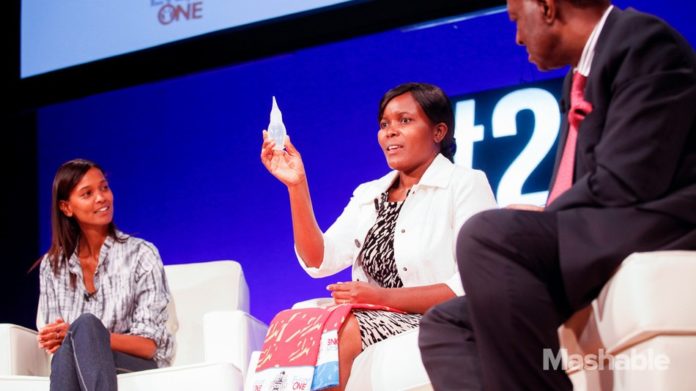Access and Simple Innovation Can Stop Maternal Death in Africa

A woman is giving birth to her baby in a dark, airless hut in Ethiopia, and it’s a particularly scary situation. She’s lying on the floor, with just a small swatch of blanket beneath her body. She doesn’t have a skilled attendant standing next to her — only her mother-in-law is there — and she was never educated on maternal or prenatal health.
No one in this hut is quite sure how the delivery will go, and there is no plan B. They can only hope that, even under these conditions, the baby and his mother turn out fine.
This story, told by model and maternal health advocate Liya Kebede at the 2014 Social Good Summit on Sunday, is a common scene in the developing world. Especially in rural regions where women do not have access to the basic health care needed for a safe delivery, and often live far away from the nearest clinic.
Approximately 800 women die from preventable causes related to pregnancy and childbirth every day, according to the World Health Organization, and 99% of all maternal deaths occur in developing countries.
Fortunately, the woman in Kebede’s story and her baby both survived the delivery without complications. The baby was named Lucky, because he, and his mother, are just that.
Kebede spoke on a panel about maternal health, joined by Victoria Shaba, a midwife working with Save the Children Malawi, and Dr. Babatunde Osotimehin, executive director of the United Nations Population Fund. Al Jazeera journalist Femi Oke moderated the panel.
They discussed how improving maternal health is one of the Millennium Development Goals (MDGs), and even though maternal deaths have dropped 45% worldwide since 1990, there’s still work to be done. It’s also very closely tied to to another MDG — reducing child mortality (17,000 children continue to die every day before their fifth birthdays).
“We thought in 2000, when we constructed the MDGs, that there were magic bullets to [solve these issues],” Osotimehin said. “There’s no magic bullet. For you to deliver children and mothers, there are four components that must be there.”
Those four components include a midwife or other medical professional, logistics for that professional to do what she needs to do (such as cheap supplies), affordable services and a manageable distance between the mother’s home and those services.
Each of these aspects of safe delivery, as Oke said during the panel, is achievable. For example, a cheap supply that could aid the logistics Osotimehin mentioned is what is commonly referred to as a “penguin,” a plastic, bird-shaped suction device (pictured above) midwives use to save babies born with difficulty breathing.
“This thing, the penguin, can save those babies,” Shaba said. “And it’s easy to do it, even for midwives in rural, hard-to-reach areas. They can use the penguin to suck the [obstructions] from the baby’s mouth and nose … A penguin is one of the essential items that we need as midwives.”
In Malawi, where Shaba works, penguins aren’t available in every area, forcing them to improvise during childbirth. This often costs the newborns’ lives. Shaba trains midwives, and several have thanked her for introducing the penguin to them.
To end the panel, Oke asked about the near future.
“We have less than 500 days left to achieve the MDGs. What is even possible in that time?” she asked.
Osotimehin had a very simple, succinct answer: “Everything.”
For more information on maternal health in the developing world, check out the Facebook Q&A with Debra Jones, U.N. Representative for Save the Children, below.
Have something to add to this story? Share it in the comments.
About Social Good Summit
The Social Good Summit is where big ideas meet new media to create innovative solutions and is brought to you by Mashable, The 92nd Street Y, The United Nations Foundation, The United Nations Development Programme and The Bill and Melinda Gates Foundation. Held during UN Week, the Social Good Summit unites a dynamic community of global leaders to discuss a big idea: the power of innovative thinking and technology to solve our greatest challenges.
Date: Sunday, Sept. 21 through Monday, Sept 22
Time: 12:00 to 6:00 p.m. each day
Location: 92nd Street Y, 1395 Lexington Ave., New York, N.Y.
Press: Press credentials will be given to press and bloggers from around the world for all Social Good Summit sessions and the Digital Media Lounge (DML). The DML is a fully wired workspace at 92Y to report out of, network with fellow members of the media and self-organize interviews and exclusive content from Social Good Summit sessions. The DML will be open from 9 a.m. to 6 p.m. each day. To apply, please fill in the form here.
A special thanks to our sponsors Beyond Right and Wrong, the Jynwel Foundation, BT and the Caterpillar Foundation.

